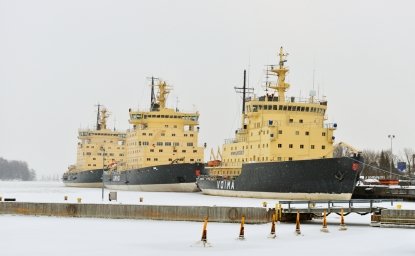A Cyprus Settlement: Pulling NATO Into the 21st Century

May 2002 - It is hard to imagine the sheer weight and magnitude of military and geopolitical issues currently facing the Bush administration: waging the war against international terrorism, containing the Israeli-Palestinian crisis, confronting anti-Western fundamentalism in the Islamic world, and reaching out to European allies that are both at odds with the United States and restive for a new NATO mission to carry forward in the 21st century.
Remarkably, President Bush has been afforded a singular opportunity to move these paramount interests forward on the back of a relatively low-decibel, second-tier issue hanging in suspended animation for nearly three decades: Cyprus.
In fact, a settlement that reunifies Cyprus before December 2002, when it will be formally invited to join the European Union, can be the key to achieving significant long-term progress on these and other major U.S. foreign policy issues. It can also catalyze the advancement of Turkey's European vocation, the promotion of Turkey's secular democratic model among Muslim nations, and the significant improvement of Turkish-Greek relations, with attendant advantages for regional cohesion.
On the other hand, a complete collapse of settlement efforts, and Cyprus's subsequent EU accession without the Turkish Cypriot community, could lead to a serious unraveling of U.S. regional interests. Turkey would see its European future burn before its eyes, triggering new internal debate about the Western ambitions put forth by Kemal Ataturk. Greece would brace for renewed Aegean instability and disproportionately high defense budgets that would prevent the full development of its economy, among the EU's poorest.
Greek Cypriots would celebrate EU accession without a shred of EU security, facing a permanent and sizable Turkish military force north of the Green Line. Turkish Cypriots would celebrate honor, pride, and steadfastness, as their meager standard of living stagnated in political, economic, and international diplomatic isolation. Future settlement talks would be indefinitely suspended, and the likelihood of a permanent division of Cyprus would sharply increase.
On a broader scale, America and Europe would face the prospect of sustained Turkish-Greek military tensions in the Aegean, in turn hampering NATO operations in the Balkan, Black Sea, and eastern Mediterranean regions, weakening Western power projection in the Middle East, the Persian Gulf, and Central Asia, and encumbering military campaigns against Al Qaeda and Iraq.
These are, at best, suppositions. What is absolutely clear is that, during the second half of 2002, something major—positive or negative—will occur in Cyprus. America and Europe must work hard and fast to achieve the positive and prevent the negative.
Cyprus has long been perceived in Washington as an issue to be monitored and managed, primarily by the Department of State. That policy may have been adequate during the Cold War and shortly thereafter. But, as the Cyprus issue comes to a head by year's end, the Bush administration should act immediately and decisively, supported by Brussels, to engage Turkey, Greece, and both Cypriot communities to achieve a settlement before the EU accession calendar expires.
The U.S. cannot afford failure in Cyprus, a sweeping breakdown in Turkish-Greek relations, a major disruption in NATO, and the regional consequences that might follow because the stakes are clear.
Turkey, with the second-largest NATO army after the U.S., borders Iraq, Iran, and Syria in the Middle East, controls the Bosporus and Dardanelles straits linking the Black and Aegean seas, enjoys close military relations with Israel, and is taking over the command of the Afghan peacekeeping force from the British in June 2002.
Greece has NATO's longest land border with the Balkans, helps secure Aegean maritime passage from the Turkish straits to the Mediterranean Sea, enjoys close political relations with many Arab governments, and adjoins energy pipelines from Libya and Egypt to Europe.
Turkey and Greece are working to normalize relations and enhance bilateral cooperation in commerce, investment, counter-terrorism, cultural activities, education, and related areas. They are even working together in support of NATO membership for Bulgaria and Romania.
But their icy relationship over the past four decades is rooted largely in Cyprus, over which they nearly went to war in 1974. Profound mistrust has dominated Turkish-Greek relations across the spectrum, most evidently manifested in their military and territorial disputes in, over, and beneath the Aegean Sea.
These disputes have been costly to NATO, obstructing, delaying, or causing the cancellation of military exercises, impacting alliance readiness and coordination, and ensuring that the alliance has been less than fully coordinated and prepared for operations in the region, such as the 1999 Kosovo campaign. Given the magnified demands of the current global security environment, especially those of the anticipated campaign against Baghdad, this is no longer tolerable.
Just as the Cyprus problem has been at the crux of Turkish-Greek mistrust, so would a comprehensive Cyprus outcome, ideally composed of both a settlement and joint EU accession, form the heart of genuine Turkish-Greek partnership that would open the door for NATO's natural progression toward its southeastern flank in the 21st century.
As NATO Secretary General Lord Robertson highlighted in an April 29 speech, major issues confronting the alliance in the Mediterranean region include: the ongoing potential for political instability; its greater geographic vulnerability to terrorism; the need to normalize Arab-Western relations, especially within the context of the Israeli-Palestinian conflict; Iraq's development of weapons of mass destruction and its short-range missile distance from the eastern Mediterranean; emerging energy security issues concerning the Caspian and Caucasus regions; and economic disparities between Europe, the Middle East, and northern Africa.
Ronald Asmus of the Council on Foreign Relations stated crisply in a May 6 Washington Post analysis that the greatest common threats to American and European security emanate "principally from a geographic area that extends from Israel eastward to Central Asia and includes the Greater Middle East and the Persian Gulf." Failure to refocus NATO on this region, he added, "runs the risk of presiding over the decline and eventual demise of the greatest alliance in history."
Alarming developments in the past year embody the conceptual basis for pulling NATO's focus away from the relative serenity of Scandinavia and northern Europe, to the shores of the Middle East and northern Africa, within comprehensive reach of the West's most notorious enemies.
Right now, Washington military planners are reviewing credible regime change options in 2003 against Saddam Hussein and his Baath Party structure, sending additional Special Forces to hunt down Al Qaeda and Taliban fighters in Afghanistan and Pakistan, and building permanent military facilities in Central Asia.
The U.S. is also deploying troops in Georgia, has maintained thousands of peacekeepers in Kosovo and Bosnia, and is considering the deployment of ceasefire monitors in the ongoing conflict between Israel and the Palestinian Authority.
In Brussels, European military planners are beefing up their deployments in Afghanistan, preparing a peacekeeping force for F.Y.R. Macedonia, and shoring up a Balkans presence in the event U.S. troops are needed for combat elsewhere.
It is self-evident, therefore, that NATO's future engagements do not lie on the north German plain, in the mountains of Norway, or on the shores of the Baltics, but in the Persian Gulf, Central Asia, the Middle East, the Caucasus, the Balkans, and the eastern Mediterranean.
To consistently prevail in these regions, NATO must be freed of the technical, logistical, and operational difficulties that emerge from Turkish-Greek disputes rooted in the mistrust over Cyprus.
Fortunately, the Bush administration has before it the best opportunity to achieve the Cyprus settlement that has eluded seven administrations since 1963. In so doing, the U.S. could reinforce the Turkish-NATO security anchor, help move Turkey's European Union accession process forward, cement Turkey's European orientation, and support the ongoing political, legal, and economic reform movements in Turkey.
In addition, the joint accession of Turkish and Greek Cypriots to the European Union would institutionalize an official Muslim presence in the bloc, smashing the psychological divide between Ankara and Brussels and laying waste to the argument of Islamist fundamentalists that Western outreach to the Muslim world is a sham.
Simultaneously, the Bush administration could provide bolstered cooperation in its relations with Greece, newly freed from Turkish entanglements, regarding Athens' efforts to tackle growing crises involving organized crime, trafficking in humans, and narcotics and arms smuggling traversing the southern Balkans—especially in neighboring Albania and F.Y.R. Macedonia.
But there has been no significant movement in political negotiations that were restarted in Cyprus in January to achieve a bicommunal agreement by June, preferably, or October, ultimately, when EU officials will submit their expected recommendation that Cyprus be among the 10 countries slated for accession to the bloc, with or without a prior settlement.
Though Turkey in December 1999 agreed with the EU that Cyprus's accession would not be conditioned upon a settlement, Ankara officials have threatened to formally integrate northern Cyprus with Turkey if EU membership precedes a settlement. In so doing, Turkey would effectively occupy EU territory, destroying any hope of imminent negotiations to join the bloc in the near future. This would, in turn, provoke an anti-European, and perhaps anti-American, backlash within Turkey's body politic that would strengthen the country's Islamists at a time when the West seeks desperately to strengthen secular moderates in Jordan, Morocco, Egypt, Indonesia, Pakistan, and other predominantly Muslim countries.
Despite the best efforts of U.N., American, and international diplomats, a political settlement has not been achieved for a critical reason: there has been inadequate emphasis on security issues. Security is viewed simply as one element of the Cyprus negotiating process, along with territorial adjustments, compensation, and political status.
Negotiators have failed to address security on its own terms, which include the need for personal security for Turkish Cypriots, who fear a recurrence of the 1963-1974 bicommunal violence; strategic security for Greek Cypriots, who will not countenance a Turkish military presence in the north; and regional security for Turkey, which seeks to ensure that no hostile military force is stationed 40 miles off its southern coast.
Greece has security interests as well, ranging from its substantial troop deployment in Cyprus to its obligations under a Joint Defense Doctrine to defend the country against Turkey in the event of hostilities.
These are the reasons why Cyprus is, after the Korean peninsula, the second most militarized area in the world, home to 30,000 Turkish troops and 3,000 Turkish Cypriot security forces in the north commanded by a Turkish officer reporting to Ankara, and 2,000 to 3,000 Greek troops and 14,000 Greek Cypriot National Guardsmen in the south commanded by a Greek officer reporting to both Athens and Nicosia.
Furthermore, the powerful influence of the Turkish General Staff on all matters in Turkey concerning Cyprus necessitates a prominent security dimension to the settlement process.
The U.N., knee-deep in the Cyprus problem since 1964, has had four decades to help solve it, and has failed. The EU is an economic bloc, struggling to achieve political consensus and incapable of providing a security umbrella for members and aspirants. The Cyprus settlement initiative will have to come from Washington.
A diplomatic breakthrough in Cyprus should be a major and immediate priority for President Bush. The U.S. should become actively engaged in promoting a Cyprus settlement now, not after the problem emerges as a full-blown crisis in the last few months of 2002. There are already too many front-burner issues with which the Bush administration must contend. Addressing the Cyprus issue appropriately today could head off intra-alliance and regional crises tomorrow.
American leadership requires bringing Turkish and Greek political and military leaders together to discuss the security environment in a post-settlement Cyprus. The Department of Defense should coordinate with the Department of State to facilitate Turkish-Greek military dialogue parallel to ongoing political negotiations between the two communities under U.N. auspices.
A pre-settlement agreement on new security arrangements, to be implemented in the post-settlement phase, could sufficiently facilitate the political talks so that a settlement could be achieved within a time frame that would allow Greek and Turkish Cypriots to jointly accede to the EU.
The signal to allies and partners in Ankara, Athens, and Nicosia from President Bush should be clear: resolve the Cyprus problem, prepare for the joint accession of the two Cypriot communities to the EU, and look toward the unified republic's eventual membership in NATO.
In so doing, Turkey, Greece, and even Cyprus can one day work together, with the U.S. and European allies, to carry out the redirection of NATO's strategic mission toward its southeastern flank and meet the challenges of a region perpetually snarled in war, terrorism, fury, instability, and crises that will unremittingly confront the West.
Author


Global Europe Program
The Global Europe Program is focused on Europe’s capabilities, and how it engages on critical global issues. We investigate European approaches to critical global issues. We examine Europe’s relations with Russia and Eurasia, China and the Indo-Pacific, the Middle East and Africa. Our initiatives include “Ukraine in Europe”—an examination of what it will take to make Ukraine’s European future a reality. But we also examine the role of NATO, the European Union and the OSCE, Europe’s energy security, transatlantic trade disputes, and challenges to democracy. The Global Europe Program’s staff, scholars-in-residence, and Global Fellows participate in seminars, policy study groups, and international conferences to provide analytical recommendations to policy makers and the media. Read more

Explore More
Browse Insights & Analysis
Risky Game: Hybrid Attack on Baltic Undersea Cables

Icebreaking Explained – Finland: Europe’s Icebreaker Superpower

